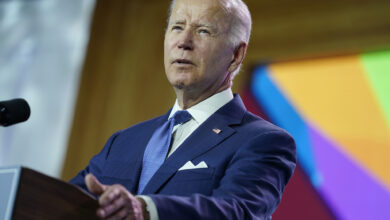
The local press in Egypt are still fiery about 16 American NGO workers, banned from travel by an Egyptian court after being accused of working illegally in the country and receiving illicit funds, being allowed to leave. Many see the case as clear US pressure on the ruling military council, which has allegedly interfered in the judicial process.
The privately owned and often daring Al-Tahrir daily calls the incident a “scandal” and writes in its front-page lead story, “It seems the US is rewarding the military council for its position in the case.” The story moves on to report on 25 judges submitting a request to the justice minister to demand an investigation into the case, in which two judges recently resigned without giving a reason.
Similar requests were also made by various groups of judges and lawyers, who protested what seems to be an infringement on the independence of the judiciary. The decision to lift the travel ban was made by Cairo Appeals Court head Abdel Moez Ibrahim, who said the decision was made after it appeared that the charges were misdemeanors. The lifting of the ban took place just hours after US Secretary of State Hillary Clinton said the case would be solved in a matter of days.
The end of the Al-Tahrir story mentions a US State Department spokesperson saying that the US is committed to Egypt’s economic and financial stability. “Amid all this mounting anger, Ibrahim decided to hold a session next Thursday to hear what remains of the foreign funding case…” reads the rather cynical finale of the story.
The privately owned Al-Shorouk follows the issue with exclusive information received from “informed sources.” According to these sources, Mahmoud Shokry, the head of the Cairo Criminal Court — which was hearing the foreign NGOs case and which pulled out from the case recently — is facing pressure from “sovereign and judicial” sources not to reveal the reasons behind the court’s pullout and two of its judges resigning. The two judges are reported by Al-Shorouk to have said in their resignation that they “feel that investigations are useless given the political interference in the judiciary’s work.” Al-Shorouk’s dramatic headline reads, “A single judge faces the military.”
Even state-run Al-Ahram daily is alert to the controversy. Its front-page lead story is about an emergency meeting of the Supreme Judiciary Council and a special People’s Assembly session announced by People’s Assembly Speaker Saad al-Katatny for 11 March in the presence of relevant ministers as well as the prime minister. In the same story, but under a separate headline, Al-Ahram also reports about a delegation of the Muslim Brotherhood and its political arm, the Freedom and Justice Party, that will participate in a conference held at Georgetown University in Washington DC.
The FJP’s mouthpiece, which has the same name as the party, also partakes in the coverage, albeit in a defensive way. FJP member and MP Mohamed al-Beltagy is quoted as saying that US Senator John McCain’s appreciation of the Brotherhood’s “imaginary mediation” to put an end to the foreign NGOs case is nothing but an “malicious” American game led by a politician who is known to be close to the Jewish lobby. Beltagy added that American funding to civil society aims primarily to support political groups against Islamists and, accordingly, it is impossible that the Brotherhood would mediate to end the crisis.
But the FJP mouthpiece, like its party, is more concerned with the constituent assembly that will draft Egypt’s upcoming constitution. Its front-page story runs a triumphant headline that reads, “The Parliament of the revolution will set the foundational stones of the constitution.” The announcement comes following an ongoing dispute over the percentage of MPs, who are predominantly Islamists, in the constituent assembly. The paper reports that the election of the assembly’s members will take place on 24 March and that the FJP’s suggestion to have 40 percent of the assembly’s members from within Parliament, with 30 percent from institutions and 30 percent public figures, was met with widespread acceptance at the joint meeting between the two houses of Parliament yesterday.
But Al-Ahram reports on disagreements over these percentages within Parliament, with the more radical Nour Party demanding more representation from Parliament in the constituent assembly, so that 60 percent are MPs and 40 percent are outsiders. This, according to Nour Party MP Mostafa Khalifa, is a way to preserve the rights of the elected majority in drafting the country’s upcoming constitution. The secular parties, however, are frowning about the potential Parliament control over the constituent assembly.
Mohamed Abdel Koddous, a member of the Brotherhood, supports the Islamist bloc in Parliament in its quest to control the assembly. Writing an op-ed in the partisan daily Al-Wafd, he says that those secular parties who want the assembly to be formed away from Parliament are the enemies of democracy. Koddous says Parliament is the best bet to form the constituent assembly because it houses a constellation of experts in different fields who are elected, and the method would spare the time of electing the constituent assembly members.
Egypt’s papers:
Al-Ahram: Daily, state-run, largest distribution in Egypt
Al-Akhbar: Daily, state-run, second to Al-Ahram in institutional size
Al-Gomhurriya: Daily, state-run
Rose al-Youssef: Daily, state-run
Al-Dostour: Daily, privately owned
Al-Shorouk: Daily, privately owned
Al-Wafd: Daily, published by the liberal Wafd Party
Youm7: Daily, privately owned
Al-Tahrir: Daily, privately owned
Freedom and Justice: Daily, published by the Muslim Brotherhood’s Freedom and Justice Party
Sawt al-Umma: Weekly, privately owned
Al-Arabi: Weekly, published by the Nasserist Party
Al-Nour: Official paper of the Salafi Nour Party




